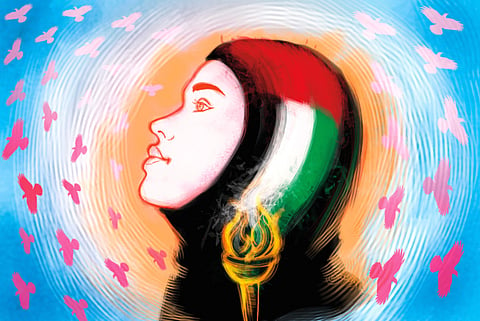In Middle East, momentum for women must pick up speed
Minister of Foreign Affairs writes on the growing role of women in the Middle East

Positive stories are easy to overlook among all the turmoil in the Middle East.
Shaikh Abdullah Bin Zayed Al Nahyan
Minister of Foreign Affairs and International Cooperation
The UAE, an Arab nation only a generation old, has worked hard to ensure that every woman has a chance to play a leading role in public and political life, that every girl receives an education and that women and girls are protected from the pernicious ideas propagated by extremists.
While admittedly starting from a low bar, women’s rights have improved in recent years elsewhere in the Middle East. This growing momentum in the region deserves to be acknowledged and fostered. It also needs to be protected from powerful forces in the region that still resist change and seek to push back against women’s rights. The costs of failure will be severe.
The Middle East, where 60 per cent of the population is below the age of 30, captures only a part of the vast potential of a young and increasingly well-educated population. We can tap into more of that potential by paying attention to the challenges women in the region face and by providing them with equal opportunity, equal pay and a strong voice in our societies.
Through the opportunities provided to women, the UAE has set an example for the region and aims to send a message of hope to the younger generation. The wasting of women’s talents must cease, and the status quo must change.
First, governments must place the empowerment of women at the top of their reform agendas. While commitment alone is not enough, it sets the stage for positive changes that can pave the way for women to pursue the same opportunities as men.
This is why the UAE adopted a strategy for the advancement of women in 2015, which has set goals for achieving further equality in the workplace. Our commitment to women’s empowerment is also embedded in our constitution and other national plans, including strategies on youth and education.
The other solution we see as critical is that we do everything we can to remove the obstacles that are preventing women from accessing the same opportunities as men. Barriers can be brought down in many ways, including through affirmative action and temporary quotas, implementing new and revamped legislation, or promoting role models.
Indeed, through such policies, the UAE has opened opportunities that were previously not widely available to women.
In government, Emirati women occupy two-thirds of jobs, which is one of the highest percentages worldwide. The UAE has elected the first female speaker in any Arab parliament, setting an important precedent for the rest of the region. Nine ministers in our cabinet are women.
In the private sector, the UAE was the first Arab country and one of only a few nations around the world to pass legislation that makes it mandatory for Emirati women to be represented on the boards of all private companies. Several years later, the percentage of women board members in the private sector is getting closer to the global average.
We realize that increasing women’s participation in the labour force, with equal opportunity and pay to men, is crucial to the growth of our economy. This is why the UAE passed a law this year, which ensures that men and women receive equal pay for equal work, and further reaffirms our commitment to women’s empowerment.
Women and girls are a critical pillar of the UAE’s development assistance to other countries. By putting women at the heart of our assistance to rural communities, for instance, we have seen pockets of prosperous communities develop in some of the most difficult parts of the world. The UAE has also taken a strong stance for girls’ rights to education and will continue to ensure that its education-assistance policy is sensitive to gender barriers.
These are but a few examples of the UAE’s ongoing commitment to the empowerment of women. These results, and others, demonstrate that breaking down barriers for women and girls will help achieve positive and lasting change in the long run.
The measures we have taken were borne out of a conviction that, unless we support women, our country will not be able to reach its true potential. Prosperity is only achievable if men and women contribute as equal partners in development. And that when young people see the tangible and positive contributions women bring to society, they, too, will fully embrace this conviction.
In a region in which young people are particularly vulnerable to the forces of globalization and extremism, the empowerment of women cannot be a cosmetic development, but a more significant and enduring trend. We must continue working together to maintain the current momentum for women’s rights. As we see it in the UAE, every step we can take to empower women is a step in the right direction.
Shaikh Abdullah Bin Zayed Al Nahyan is the Minister of Foreign Affairs and International Cooperation
This article was first published in The Globe and Mail
Sign up for the Daily Briefing
Get the latest news and updates straight to your inbox



